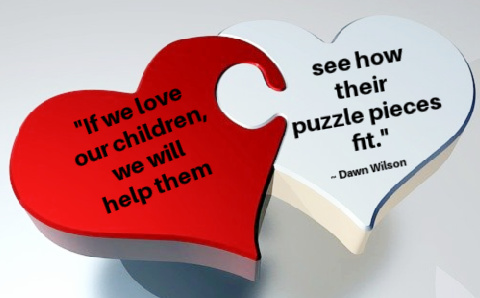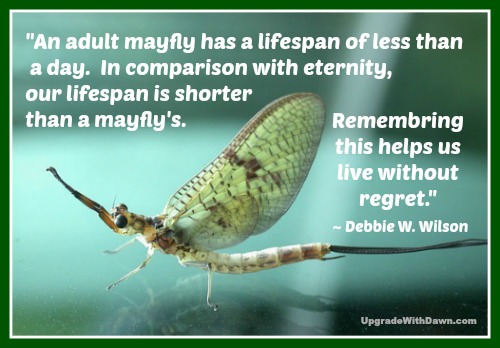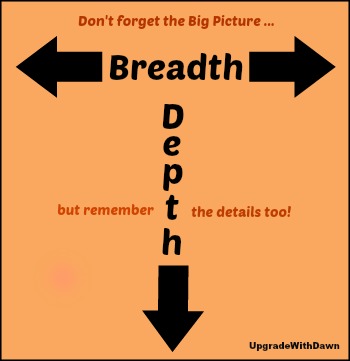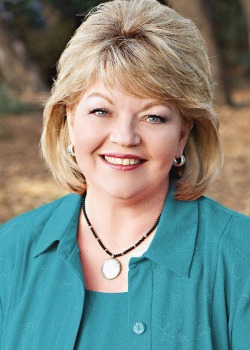'Forcing a Piece' Doesn't Work in Parenting
In this Parenting UPGRADE, Dawn Wilson reminds us that each child is unique in personality and gifts, and we're wise to discover that uniqueness and cultivate it.
I discovered early on in parenting that siblings are different and should never be compared. Each has unique giftings and will make different contributions in the world.
As my two sons grew up, one of our family traditions was putting together a puzzle at their grandparents' home in Palm Springs, Californai, during the Thanksgiving holiday.
Every year a new puzzle was completed—even if Grandpa Wilson had to finish the project after everyone went home.
Lessons in Puzzle-working
I loved watching my boys work the puzzles.
Our youngest, the "Mr. Social" of the group, would stay at the task only as long as his cousin or his older brother would work with him.
He worked quickly, picking up random pieces and laying them down again. Once, he impatiently tried to "force a piece" into the puzzle—bending one of the "bumps" in the process.
His frustrated brother became a teacher, explaining that "pieces have to be a perfect fit or the puzzle won't come out right."
Unlike our youngest, our methodical oldest child enjoyed quiet time alone with the puzzle, carefully analyzing each piece, categorizing the shapes, and relishing each new discovery. When others joined him, he often directed their efforts with a "Try that one," or "Try it the other way."
While everyone participated in the project, he was clearly a manager.
How unique each boy was. Working the puzzles highlighted those differences.
Lessons from Baseball Cards and Sports
Puzzle working wasn't the only activity that revealed their personalities. The boys' traits became obvious in other areas of their lives.
Both collected baseball cards and, like many children, dreamed of playing in the big leagues.
Our youngest's cards were randomly stached in cluttered drawers and overstuffed school bags so he could pull them out at random to enjoy them.
Our older son categoried his and methodically placed them in boxes. An entire notebook was devoted to a favorite at the time, Orel Hershiser.
Eventually, he helped his brother sort his collection, and they shared hours "talking baseball."
The boys made relatives laugh as they mimicked sports announcers, pretending to call the games on television. The youngest focused on the action. The oldest developed the strategy behind each play.
Though they played and excelled in other sports, it was in baseball that the pieces of their life puzzles began to fit.
Our youngest—temporarily labeled "Wild Thing" in his youth for his mean fastball that sometimes lacked accuracy and sent batters scurrying out of the batter's box—became an outstanding pitcher with a Nolan Ryan bite. Meanwhile, his older brother's pitching—steady and strategic—resembled his hero Hershiser, the deliberate "Bulldog."
The oldest expected the youngest to react to life and sports as he would—with intensity!
But our easy-going youngest never could understand why it was so hard for his brother to simply relax.
As their sports careers intertwined in high school, however, and interesting change took place.
Our oldest child gained respect for his fun-loving, confident younger brother. And our youngest learned discipline and leadership skills from his brother.
Though big league dreams ended, our oldest ended his senior year of high schol satisfied with his accomplishments in sports, knowing he had done his best.
But our youngest son's senior year escalated from excitement to ectasy as his baseball team reached the San Diego finals. His brother watched him pitch the winning game, and then joined my husband in advising him when scouts came calling.
Big brother was truly delighted when the Philadelphia Phillies drafted our young son in 1998.
Some time later, it was no surprise to any of us that our oldest ended up coaching high school sports. It was a perfect fit for our analytical son. His pieces of the puzzle made sense too.
Don't Force a Piece
I sometimes shake my head as parents try to "force a piece" in the puzzle-life of their child. In the process, they break their child's spirit and end up with a completed picture that was never intended by God.
If we love our children, we will help them see how their puzzle pieces fit.
So how can we cooperate with God to help the puzzle pieces of our children fit properly?
1. Never Compare.
It's not wise to compare your child with anyone—whether in the family, or at school, church, or anywhere else.
It's the foolish parent who says, "Why can't you be more like your brother/sister?"
I actually said that once to one of my sons. His response? "Because I'm not him!"
(Well, duh. Lesson learned.)
The Bible explains that comparison is not wise because God is the giver of all our gifts, of all we receive in the way of personality, skills, etc. (James 1:17; 1 Corinthians 4:7; Isaiah 45:9).
2. Cultivate Their Uniqueness.
Help your child discover his or her unique personality, gifting, and other distinguishing traits and skills. And then take steps to cultivate them.
Childhood is the time to try out many activities, not only for fun, but to discover innate strengths and weaknesses.
Don't "force pieces" where they don't belong.
- A child may try out for sports and discover a new passion—or may genuinely hate exercise.
- A child may take up a musical instrument and thrive, or hate every single second of practice.
- A child may exhibit a "gift" for writing from an early age, or struggle with it in school.
(NOTE: I'm not saying we should allow for "quitters"—and there may need to be some parent/child negotiations. But we do need to become aware when there's not a good fit, and make allowances for that.)
Sometimes a different approach can make a difference.
For example, a boy may say he "hates" reading, but can find inspiration to read in the sports pages of a newspaper, or a biography about someone in history (a pirate or ruthless warrior, perhaps).
Help your child see the different personality types in the scriptures as well—impulsive Peter, wise Esther, etc. And help your child understand how Jesus grew in a number of areas in his young life (Luke 2:52).
3. Praise Efforts.
Even when children operate in their uniqueness, they may have days when they don't measure up. They are not failures, even when sometimes failing.
They are learning important information for future attempts.
So don't provoke (exasperate/embitter) your children, causing them to lose heart (become discouraged)—Colossians 3:21/ Ephesians 6:4. Intead, train them well and encourage them with appropriate praise.
(NOTE: This is not the same as the philosophy of praising everyone for everything all the time.)
4. Focus on an Eternal Perspective.
Help your child see more than today.
Encourage the use of spiritual gifts, as they become apparent, to love God and serve others.
Help them discover how they can become more like Jesus—no matter their personality or gifting.
In all their activities, be sure to include spiritual quests and community outreaches to the glory of God.
In all this counsel, remember that you will never be a perfect parent. You will make many mistakes—even in pursuing your child's uniqueness.
If you love with wisdom, and discipline with love, they will understand your inability to be perfect.
Children may be puzzling at times, but they are created in the image of God, and His creation is precious—every single child! Take time to consider the pieces of their puzzle, because it's so worth it!
I'm so glad we—for the most part—worked the puzzle right.
If you are a parent, have you discovered your child's/children's uniqueness? What part of the puzzle of their lives is yet to be discovered? Ask God to help you!
Dawn Wilson, founder and President of Heart Choices Today, is a speaker and author,  and the creator the blog, Upgrade with Dawn. She is a contracted researcher/reviewer for women's teacher and revivalist, Nancy DeMoss Wolgemuth at Revive Our Hearts, and is a regular columnist at Crosswalk.com. She and her husband Bob live in sunny Southern California, and Dawn has traveled with Him in Pacesetter Global Outreach. They have two grown, married sons, three granddaughters and a rascally maltipoo, Roscoe.
and the creator the blog, Upgrade with Dawn. She is a contracted researcher/reviewer for women's teacher and revivalist, Nancy DeMoss Wolgemuth at Revive Our Hearts, and is a regular columnist at Crosswalk.com. She and her husband Bob live in sunny Southern California, and Dawn has traveled with Him in Pacesetter Global Outreach. They have two grown, married sons, three granddaughters and a rascally maltipoo, Roscoe.
Graphic adapted, courtesy of Piro4D at Pixabay.
 Post a Comment → Posted on
Post a Comment → Posted on  Thursday, November 18, 2021 at 9:36AM
Thursday, November 18, 2021 at 9:36AM  Comparison,
Comparison,  Dawn Wilson,
Dawn Wilson,  Don't Compare,
Don't Compare,  Eternal Perspective,
Eternal Perspective,  Parent,
Parent,  Parenting,
Parenting,  Parents,
Parents,  Praising children,
Praising children,  Puzzle Pieces,
Puzzle Pieces,  Uniqueness of Children,
Uniqueness of Children,  Upgrade with Dawn Upgrade Your Life
Upgrade with Dawn Upgrade Your Life  Parenting
Parenting 








